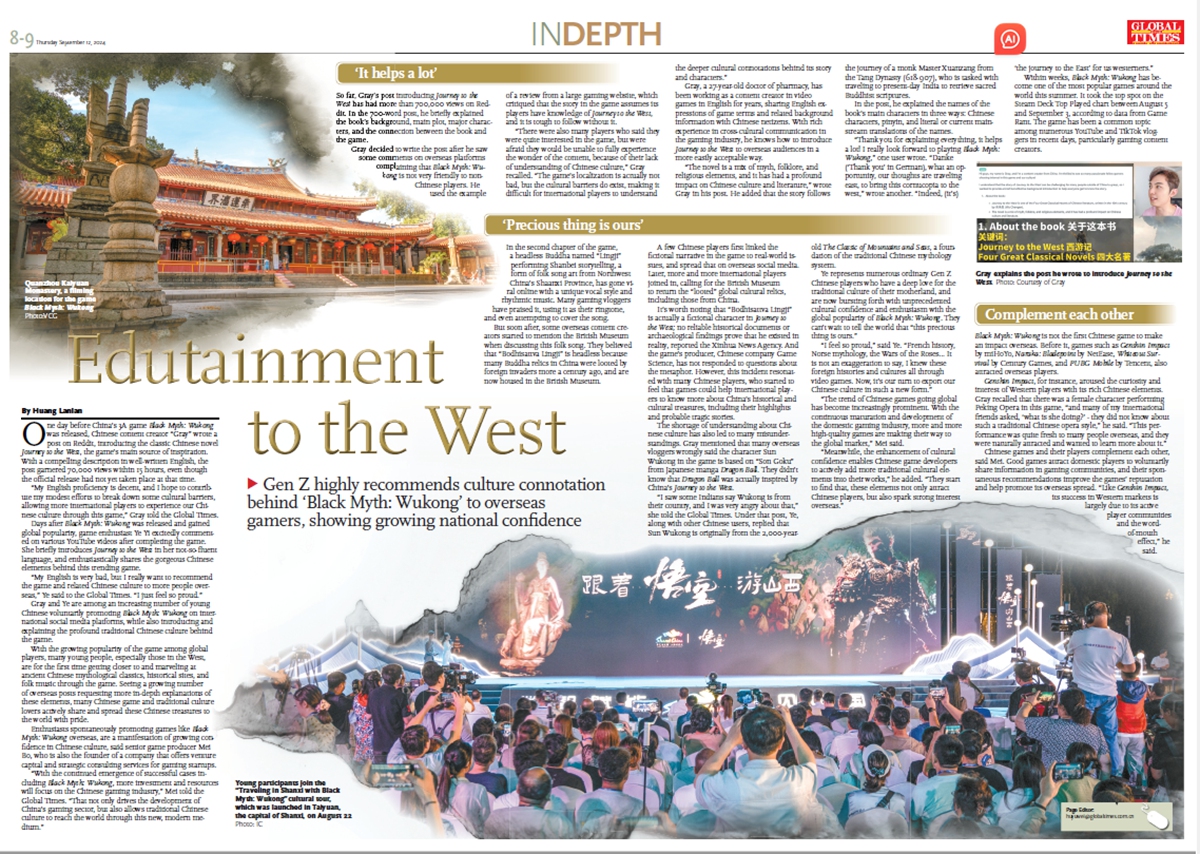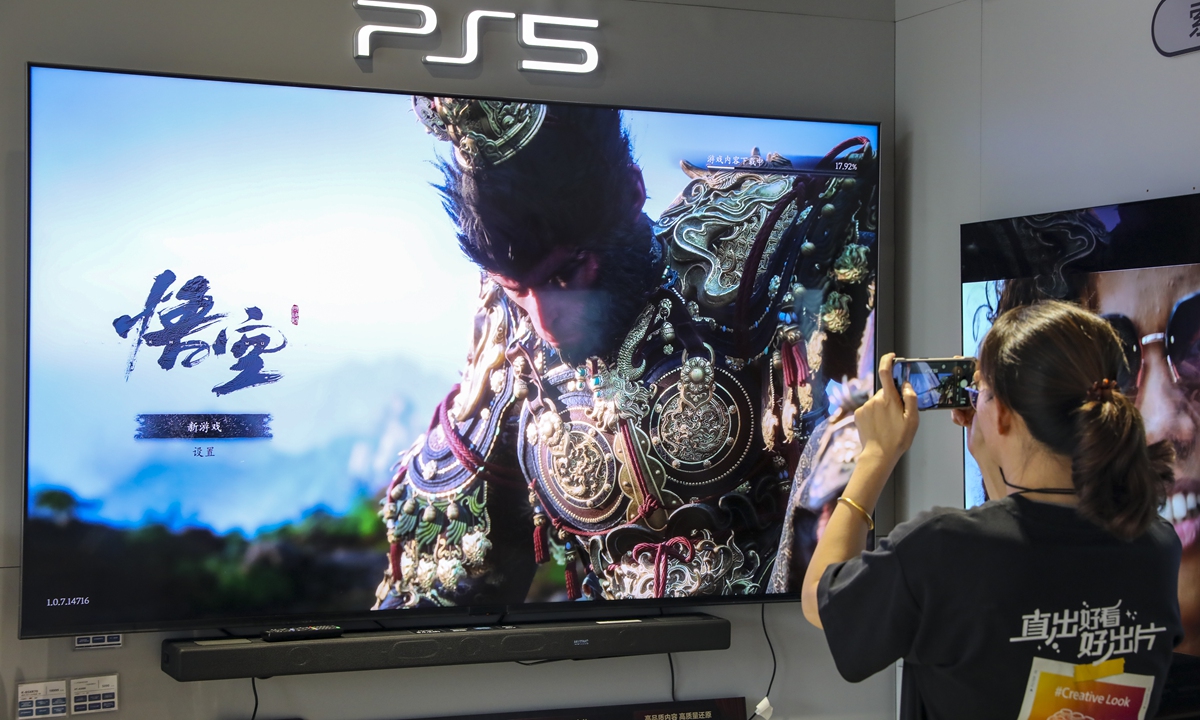
A woman takes a photo of a screen showing Black Myth: Wukongat an electronics market in Shanghai on August 20, 2024. Photo: VCG
One day before China's 3A game
Black Myth: Wukongwas released, Chinese content creator "Gray" wrote a post on Reddit, introducing the classic Chinese novel
Journey to the West,the game's main source of inspiration. With a compelling description in well-written English, the post garnered 70,000 views within 15 hours, even though the official release had not yet taken place at that time.
"My English proficiency is decent, and I hope to contribute my modest efforts to break down some cultural barriers, allowing more international players to experience our Chinese culture through this game," Gray told the Global Times.
Days after
Black Myth: Wukongwas released and gained global popularity, game enthusiast Ye Yi excitedly commented on various YouTube videos after completing the game. She briefly introduces Journey to the West in her not-so-fluent language, and enthusiastically shares the gorgeous Chinese elements behind this trending game.
"My English is very bad, but I really want to recommend the game and related Chinese culture to more people overseas," Ye said to the Global Times. "I just feel so proud."
Gray and Ye are among an increasing number of young Chinese voluntarily promoting
Black Myth: Wukongon international social media platforms, while also introducing and explaining the profound traditional Chinese culture behind the game.
With the growing popularity of the game among global players, many young people, especially those in the West, are for the first time getting closer to and marveling at ancient Chinese mythological classics, historical sites, and folk music through the game. Seeing a growing number of overseas posts requesting more in-depth explanations of these elements, many Chinese game and traditional culture lovers actively share and spread these Chinese treasures to the world with pride.
Enthusiasts spontaneously promoting games like
Black Myth: Wukongoverseas, are a manifestation of growing confidence in Chinese culture, said senior game producer Mei Bo, who is also the founder of a company that offers venture capital and strategic consulting services for gaming startups.
"With the continued emergence of successful cases including
Black Myth: Wukong, more investment and resources will focus on the Chinese gaming industry," Mei told the Global Times. "That not only drives the development of China's gaming sector, but also allows traditional Chinese culture to reach the world through this new, modern medium."
、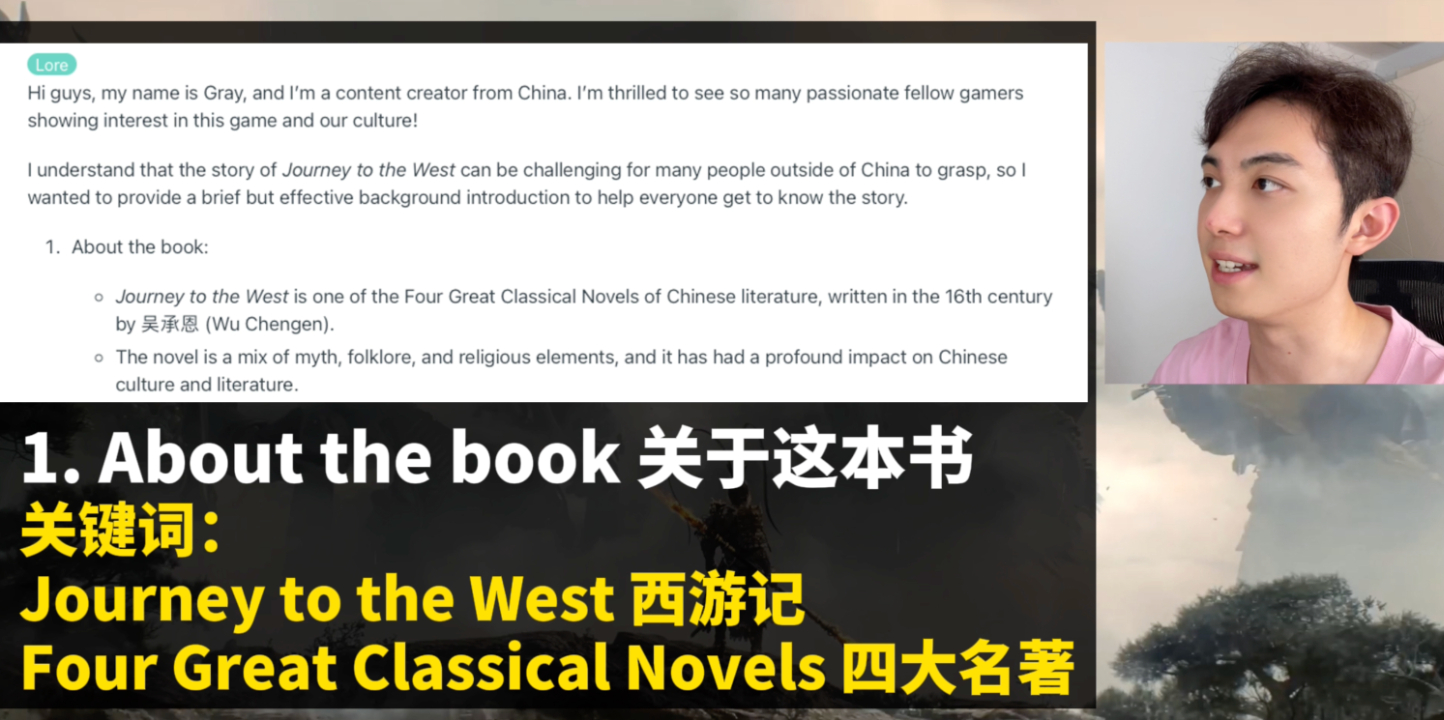
Gray explains the post he wrote to introduce Journey to the West. (Photo: Courtesy of Gray)
'It helps a lot'So far,
MKS sports Gray's post introducing Journey to the West has had more than 700,000 views on Reddit. In the 700-word post, he briefly explained the book's background, main plot, major characters, and the connection between the book and the game.
Gray decided to write the post after he saw some comments on overseas platforms complaining that
Black Myth: Wukongis not very friendly to non-Chinese players. He used the example of a review from a large gaming website, which critiqued that the story in the game assumes its players have knowledge of
Journey to the West,and it is tough to follow without it.
"There were also many players who said they were quite interested in the game, but were afraid they would be unable to fully experience the wonder of the content, because of their lack of understanding of Chinese culture," Gray recalled. "The game's localization is actually not bad, but the cultural barriers do exist, making it difficult for international players to understand the deeper cultural connotations behind its story and characters."
Gray, a 27-year-old doctor of pharmacy, has been working as a content creator in video games in English for years, sharing English expressions of game terms and related background information with Chinese netizens. With rich experience in cross-cultural communication in the gaming industry, he knows how to introduce Journey to the West to overseas audiences in a more easily acceptable way.
"The novel is a mix of myth, folklore, and religious elements, and it has had a profound impact on Chinese culture and literature," wrote Gray in his post. He added that the story follows the journey of a monk Master Xuanzang from the Tang Dynasty (618-907), who is tasked with traveling to present-day India to retrieve sacred Buddhist scriptures.
In the post, he explained the names of the book's main characters in three ways: Chinese characters, pinyin, and literal or current mainstream translations of the names.
"Thank you for explaining everything, it helps a lot! I really look forward to playing
Black Myth: Wukong," one user wrote. "Danke ('Thank you' in German), what an opportunity, our thoughts are traveling east, to bring this cornucopia to the west," wrote another. "Indeed, (it's) 'the journey to the East' for us westerners."
Within weeks,
Black Myth: Wukonghas become one of the most popular games around the world this summer. It took the top spot on the Steam Deck Top Played chart between August 5 and September 3, according to data from Game Rant. The game has been a common topic among numerous YouTube and TikTok vloggers in recent days, particularly gaming content creators.
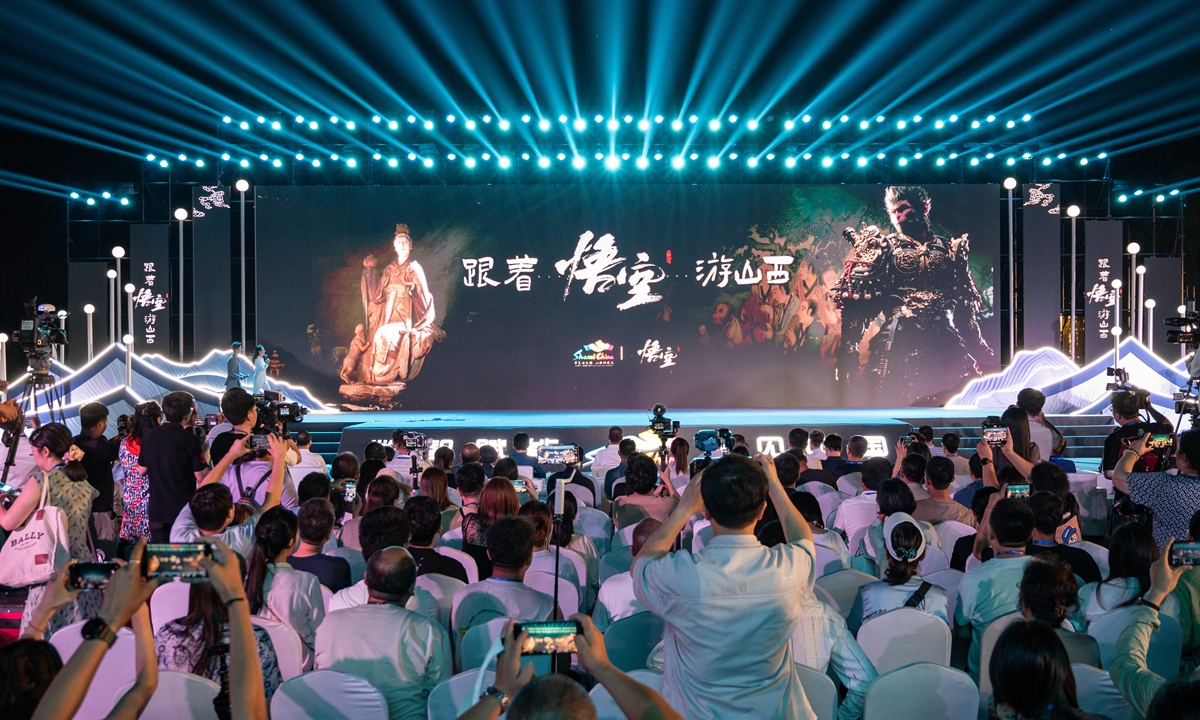
Young participants join the "Traveling in Shanxi with Black Myth: Wukong"cultural tour, which was launched in Taiyuan, the capital of Shanxi, on August 22 Photo: IC
'Precious thing is ours'
In the second chapter of the game, a headless Buddha named "Lingji" performing Shanbei storytelling, a form of folk song art from Northwest China's Shaanxi Province, has gone viral online with a unique vocal style and rhythmic music. Many gaming vloggers have praised it, using it as their ringtone, and even attempting to cover the song.
But soon after, some overseas content creators started to mention the British Museum when discussing this folk song. They believed that "Bodhisattva Lingji" is headless because many Buddha relics in China were looted by foreign invaders more a century ago, and are now housed in the British Museum.
A few Chinese players first linked the fictional narrative in the game to real-world issues, and spread that on overseas social media. Later, more and more international players joined in, calling for the British Museum to return the "looted" global cultural relics, including those from China.
It's worth noting that "Bodhisattva Lingji" is actually a fictional character in Journey to the West; no reliable historical documents or archaeological findings prove that he existed in reality, reported the Xinhua News Agency. And the game's producer, Chinese company Game Science, has not responded to questions about the metaphor. However, this incident resonated with many Chinese players, who started to feel that games could help international players to know more about China's historical and cultural treasures, including their highlights and probable tragic stories.
The shortage of understanding about Chinese culture has also led to many misunderstandings. Gray mentioned that many overseas vloggers wrongly said the character Sun Wukong in the game is based on "Son Goku" from Japanese manga Dragon Ball. They didn't know that Dragon Ball was actually inspired by China's Journey to the West.
"I saw some Indians say Wukong is from their country, and I was very angry about that," she told the Global Times. Under that post, Ye, along with other Chinese users, replied that Sun Wukong is originally from the 2,000-year-old The Classic of Mountains and Seas, a foundation of the traditional Chinese mythology system.
Ye represents numerous ordinary Gen Z Chinese players who have a deep love for the traditional culture of their motherland, and are now bursting forth with unprecedented cultural confidence and enthusiasm with the global popularity of
Black Myth: Wukong. They can't wait to tell the world that "this precious thing is ours."
"I feel so proud," said Ye. "French history, Norse mythology, the Wars of the Roses... It is not an exaggeration to say, I knew these foreign histories and cultures all through video games. Now, it's our turn to export our Chinese culture in such a new form."
"The trend of Chinese games going global has become increasingly prominent. With the continuous maturation and development of the domestic gaming industry, more and more high-quality games are making their way to the global market," Mei said.
"Meanwhile, the enhancement of cultural confidence enables Chinese game developers to actively add more traditional cultural elements into their works," he added. "They start to find that, these elements not only attract Chinese players, but also spark strong interest overseas."
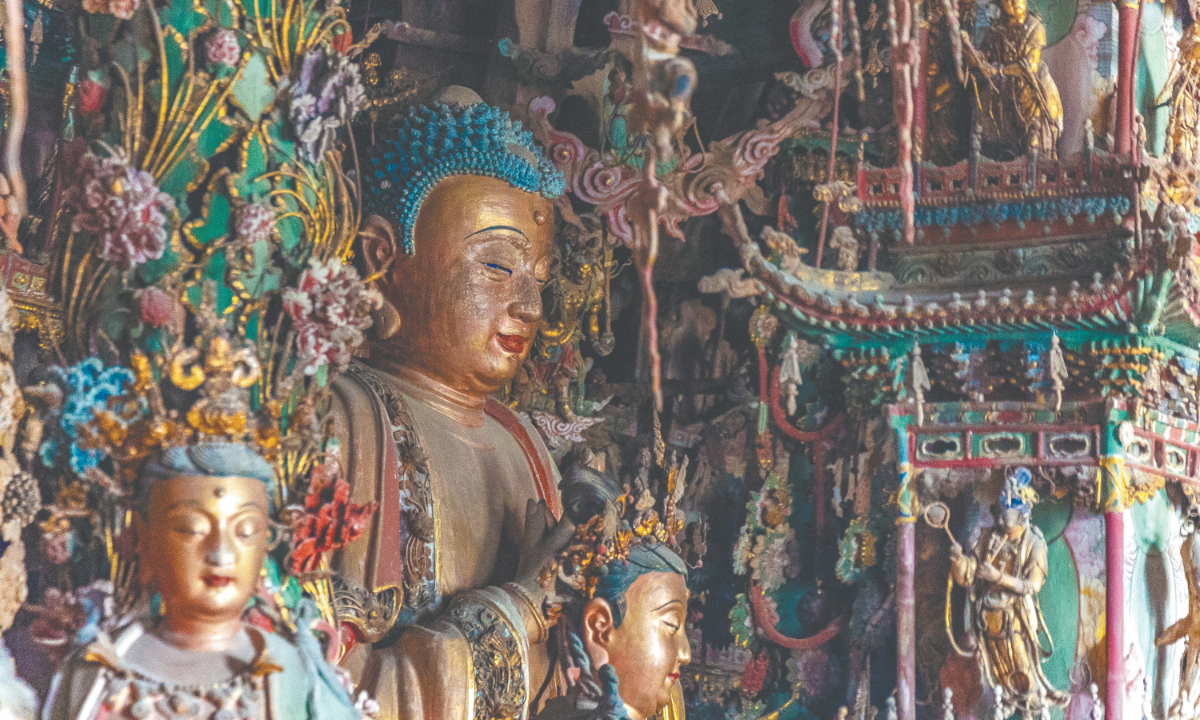
Buddha statues inside the Xiao Xi Tian Temple, a historical site from the Ming Dynasty (1368-1644), in Xixian county, North China's Shanxi Province Photo: Li Hao/GT
Complement each other
Black Myth: Wukongis not the first Chinese game to make an impact overseas. Before it, games such as Genshin Impactby miHoYo, Naraka: Bladepointby NetEase, Whiteout Survivalby Century Games, and PUBG Mobileby Tencent, also attracted overseas players.
Genshin Impact, for instance, aroused the curiosity and interest of Western players with its rich Chinese elements. Gray recalled that there was a female character performing Peking Opera in this game, "and many of my international friends asked, 'what is she doing?' - they did not know about such a traditional Chinese opera style," he said. "This performance was quite fresh to many people overseas, and they were naturally attracted and wanted to learn more about it."
Chinese games and their players complement each other, said Mei. Good games attract domestic players to voluntarily share information in gaming communities, and their spontaneous recommendations improve the games' reputation and help promote its overseas spread. "Like Genshin Impact, its success in Western markets is largely due to its active player communities and the word-of-mouth effect," he said.
